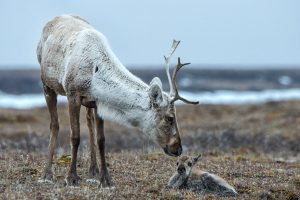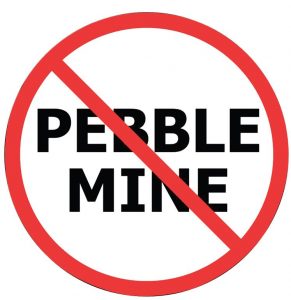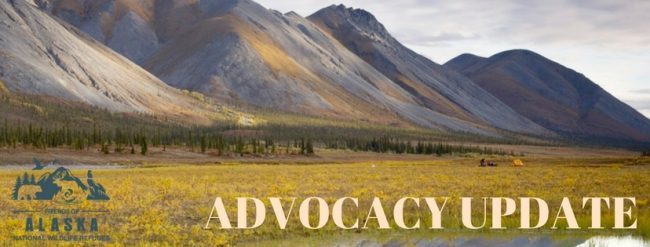Advocacy Update
by David Raskin, Friends Board President
The battles continue to save the Izembek and Arctic Refuges and Bristol Bay from destructive developments and limit the impact of the expected predator control regulations for the Kenai Refuge.
Izembek NWR
We have no news concerning the Department of Justice appeal of the decision by the Anchorage Federal District Court that granted the motion for summary judgment in our lawsuit that challenged the legality of the land exchange and road through the heart of the Izembek Wilderness. This decision had halted all activity related to the transfer of Refuge land and the construction of a road. Although the DOI instructed the USFWS to continue working on a contaminants analysis regarding the lands that they would exchange, there is no indication of any work that would violate the decision by the Court. We assume that the government is continue its efforts to figure out how to respond to the court order and explain their decision process to satisfy the court. Our conservation partners and legal team are closely monitoring any such actions and will mount all available legal and legislative challenges to counter any attempt by the Department of Interior (DOI) to revive the unacceptable land exchange and destructive road.
Arctic NWR
The DOI continues to press forward with plans to sell leases for oil and gas development in the Coastal Plain of the Arctic Refuge. BLM is in the process of preparing a final EIS, which is expected to be released in August and a decision soon after the close of the 30-day comment period. Since the DEIS was so hastily done and grossly inadequate, without a new DEIS process it is likely that a Final EIS will be insufficient to withstand legal challenges. Lease sales are planned this year.
The proposed seismic exploration is expected to begin next season and extend over two years. It requires a plan that would satisfy the Incidental Take Regulations (ITR) regarding denning polar bears and marine mammals. The recently-proposed low-altitude aerial survey appears to have been abandoned. The French company CGG stated that they no plans to conduct aerial surveys of the Coastal Plain. This means that prior to the planned lease sale, there may be no new information about the amount of oil under the area. This is another indication of industry’s waning interest in drilling the Arctic Refuge. The conservation community is closely monitoring these developments and will take whatever actions are necessary to prevent the undesirable impacts of seismic exploration and oil leases.
A positive development is the Restore Protections Bill (HR 1146) that would remove the tax bill provision that authorized the sale of leases in the Coastal Plain. The bill was introduced by Representative Jared Huffman and had a record 182 cosponsors. It was reported out of committee and a full House vote is expected in July. Although it is expected to pass the House, the Senate is unlikely to pass it.
Kenai NWR Predator Control Regulations
The proposed Kenai Refuge predator control regulations have not been released, but are expected very soon. The most serious threat to wildlife is the expected regulation that will allow hunting of brown bears over bait. At a minimum, we will urge the Kenai Refuge to develop a permit process to limit the areas of the Refuge and the number of bears to be taken consistent with mandated management practices and potential threats to the brown bear population. The conservation community is closely monitoring any developments and is prepared to provide the responses necessary to protect the integrity and biological diversity of the Kenai Refuge wildlife.
Pebble Mine Friends joined 13 conservation organizations on the submission of a 433-page comment on the Corps of Engineers Pebble Mine DEIS. These comments were prepared and submitted by Trustees for Alaska and the Sierra Club Environmental Law Program. The breadth and contents of this extensive set of comments and its numerous attachments document the grossly inadequate DEIS prepared by the Corps. We hope that this horrible project with its potential impacts on Bristol Bay salmon fisheries and many national wildlife refuges will ultimately be stopped after a 15-year battle. We thank the staffs of Trustees and Sierra Club for this monumental effort.
Friends joined 13 conservation organizations on the submission of a 433-page comment on the Corps of Engineers Pebble Mine DEIS. These comments were prepared and submitted by Trustees for Alaska and the Sierra Club Environmental Law Program. The breadth and contents of this extensive set of comments and its numerous attachments document the grossly inadequate DEIS prepared by the Corps. We hope that this horrible project with its potential impacts on Bristol Bay salmon fisheries and many national wildlife refuges will ultimately be stopped after a 15-year battle. We thank the staffs of Trustees and Sierra Club for this monumental effort.
